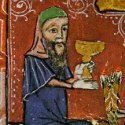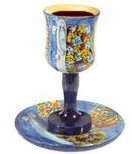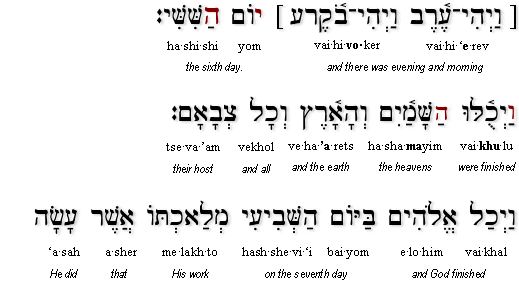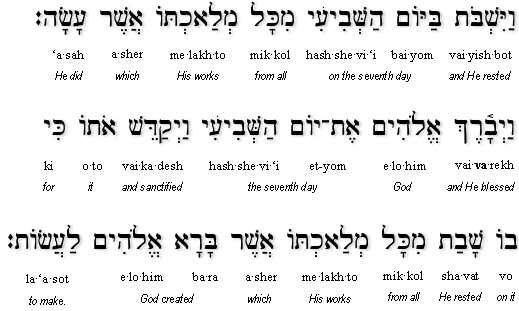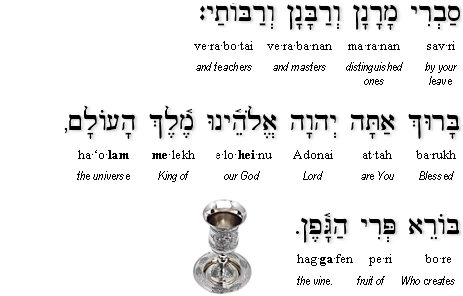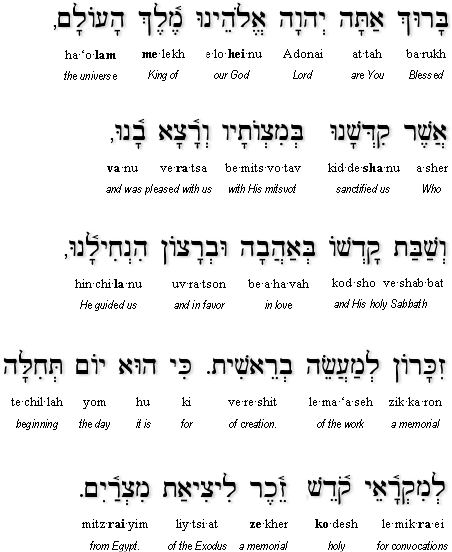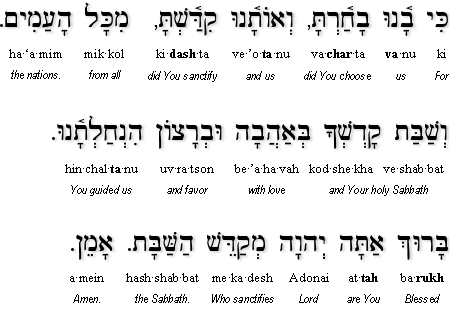|
|
 |
 |
|
...call the Sabbath a delight and the holy day of the LORD honorable...
- Isaiah 58:13
|
 |
 |
|
BEFORE WE SIT DOWN to eat our Friday night meal, it is customary to sanctify the time by reciting Kiddush ("sanctification"), a special ceremony performed at the beginning of the Sabbath (and on other holidays). Normally Kiddush is recited by the father of the household while holding a cup of wine. The ceremony has two distinct parts. First Genesis 1:31-2:3 is read and then a Hebrew blessing is recited that sanctifies the occasion and thanks God for the gift of the Sabbath day.
|
|
|
 |
 |
|
The First Part of Kiddush
During the first part of Kiddush the leader reads (or sometimes sings) the first few verses from Genesis chapter two, which speak about God's completion of the creation of the heavens and the earth and of His resting from the work of creation. Note that before reading Genesis 2:1, however, the leader recites the last part of Genesis 1:31 in an undertone until he reaches the last two words of the verse ("Yom Ha-shishi"), which he then clearly reads. This is intended to connect the words "Yom Ha-shishi" with the following two words of Genesis 2:1 (i.e., "Vaikhulu Ha-shamayim") to form an acronym for the sacred Name of God (i.e., YHVH).
|
 |
 |
 |
 |
 |
 |
 |
 |
 |
|
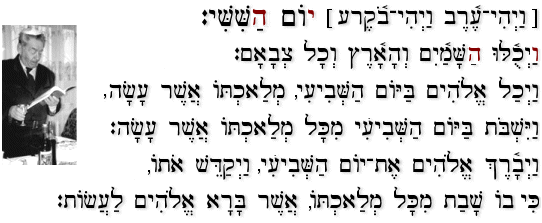 |
|
|
|
 |
|
|
|
|
[vaihi-erev, vaihi-voker] Yom Ha-shishi,
Vaikhulu Ha-shamayim ve-ha'aretz ve-khol tzeva'am:
vaikhal Elohim bayom hashevi'i, melakhto asher 'asah
vaiyishbot baiyom hashevi'i mikol melakhto asher 'asah:
vaiyvarekh Elohim et-yom hashevi'i, vaikadesh oto,
ki vo shavat mikol melakhto asher bara Elohim la'asot.
|
|
|
|
Translation:
[And the evening and the morning were] the sixth day. Thus the heavens and the earth were finished, and all the host of them. And on the seventh day God ended his work which he had made; and he rested on the seventh day from all his work which he had made. And God blessed the seventh day, and sanctified it: because that in it he had rested from all his work which God created and made.
|
|
|
|
The Second Part of Kiddush
The second part of Kiddish is the customary Hebrew blessing that sanctifies the occasion and thanks God for the gift of the Sabbath day:
|
|
|
|
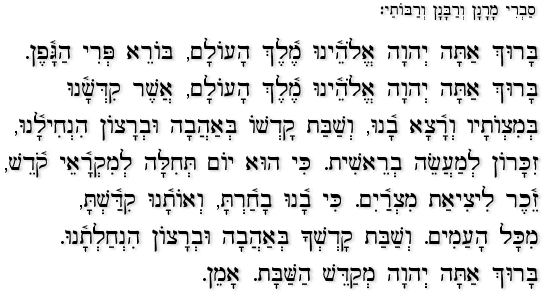 |
|
|
|
 |
|
|
|
|
|
[Savri maranan ve-rabanan ve-rabotai:]
Barukh attah Adonai Eloheinu melekh ha-olam, borei pe'ri ha-gafen.
Barukh attah Adonai Eloheinu melekh ha-olam, asher kiddeshanu
be-mitzvotai ve-ratza vanu, ve-shabbat kodsho be'ahavah uv'ratzon hinchilanu,
zikaron le'ma'aseh ve'reishit. Ki hu yom techillah lemikra'ei kodesh,
zekher litzi'at mitzrayim. Ki vanu vacharta, ve'otanu kiddashta,
mikol ha-'amim. Ve-shabat kodeshekha be-ahavah uv'ratzon hinchaltanu.
Barukh attah Adonai me-kadesh ha-Shabbat. Amen.
|
|
|
|
Translation:
[ Rabbinical: "By your leave distinguised gentlemen, masters, and teachers..." ]
Blessed art Thou, Adonai our God, King of the univese, Who creates the fruit of the vine. [Respond: Amen.]
Blessed are You LORD, King of the Universe, who made us holy with his commandments and favored us, and gave us His holy Sabbath, in love and favor, to be our heritage, as a reminder of the Creation. It is the foremost day of the holy festivals marking the Exodus from Egypt. For out of all the nations You chose us and made us holy, and You gave us Your holy Sabbath, in love and favor, as our heritage. Blessed are you LORD, Who sanctifies the Sabbath [Respond: Amen.]
After this blessing is recited, it is customary to give each person present some wine from the Kiddush cup, though note the following:
|
|
|
|
Lifting the Cup of Salvation
|
|
 |
 |
|
In Jewish tradition, the Sabbath is regarded as the first and most important of the holy days, since it is both a memorial of God's work of creation (Exod. 20:11; 31:17) and of the redemption from Egypt by the blood of the lamb (Deut. 5:15). It is "the foremost day of the holy festivals marking the Exodus from Egypt." For Messianic believers, Yeshua is the Lamb of God who embodies the Substance of all that the Sabbath day foreshadows (for more on this, see "Yeshua our Sabbath Rest").
Since the Sabbath ultimately centers on the person of Yeshua the Messiah (as our Creator and Redeemer), we consciously seek ways to honor him during this ceremony. For instance, we recall His promise: "Where two or three are gathered in my name, there am I among them" (Matt. 18:20), and therefore we consciously acknowledge His Presence at our Sabbath table. We welcome His Presence in by asking for the Shekhinah Glory of God (the Holy Spirit) to fill our hearts and to give us a sense of genuine communion. Moreover, before we drink from the cup we acknowledge that Yeshua is the vine (×Ö·×ֶּפֶ×) and we are branches (John 15:1,5), and that therefore our lives are entirely dependent upon Him as our Lord and Savior. We sanctify the kiddush cup by understanding that it symbolizes the "Cup of Salvation" that Yeshua offers to those who are trusting in Him...
When King David asked, "What shall I render to the LORD for all his benefits to me," he glorified the LORD for the wonder of his salvation and said, "I will lift up the cup of salvation and call on the name of the LORD" (Psalm 116:13):
|
 |
 |
|
The "cup of salvation" that King David lifted up prefigured the third cup of the Passover Seder (called the "Cup of Redemption") which was customarily partaken after the Afikomen ceremony at the end of the meal. It is worth remembering that this was the cup that Yeshua sanctified to commemorate the "blood of the new covenant" which He poured out for the remission of our sins (Luke 22:20; Matt. 26:28).
Because of this glorious truth, it may be helpful to recite the following verses before partaking of the Sabbath kiddush cup:
"Return, O my soul, to your rest; for the LORD has dealt bountifully with you. For You have delivered my soul from death, my eyes from tears, my feet from stumbling; I will walk before the LORD in the land of the living.... What shall I render to the LORD for all his benefits to me? I will lift up the cup of salvation and call on the name of the LORD" (Psalm 116:7-9, 12-13).
Thanking God for Shabbat:
×ָּר×Ö¼×Ö° ×Ö·×ªÖ¼Ö¸× ×××× ×Ö±××Öµ× ×Ö¼ ×Ö¶×Ö¶×Ö° ×ָע×Ö¹×Ö¸×
×ֲש×ֶר × Ö¸×ªÖ·× ×Ö¸× ×Ö¼ ×Ö·×Ö¼Ö´××, ×ֻקּ×ֹת, ×Ö¼××Ö¹×¢Ö²×Ö´×× ×ְש×Ö´×Ö°×Ö¸×
×Ö´×Ö°××Ö¹× ×ֵש××Ö¼×¢Ö· ×Ö·×ָּש×Ö´××Ö· ×Ö²××Ö¹× Öµ×× ×Ö¼, ××ֹר ×ָע×Ö¹×Ö¸×
ba·rookh a·tah Adonai E·lo·hei'·noo me'·lekh ha·o·lahm
a·sher na·tan la'·noo cha·geem, choo·koht, oo'mo·a·deem le·seem·chah
leekh·vohd Ye·shoo'·a ha·ma·shee'·ach a·do·ney'·noo ohr ha·o·lahm

"Blessed art You, LORD our God, King of the universe,
who has given to us holidays, customs, and seasons of happiness,
for the glory of our Lord Yeshua the Messiah, the light of the world."
(Download Study Card)
|
 |
|
|
 |
|
|
 |
 |
|
Quick Friday Night Kiddush Guide
|
|
 |
 |
|
Kiddush Transliterated (part 1):
|
|



